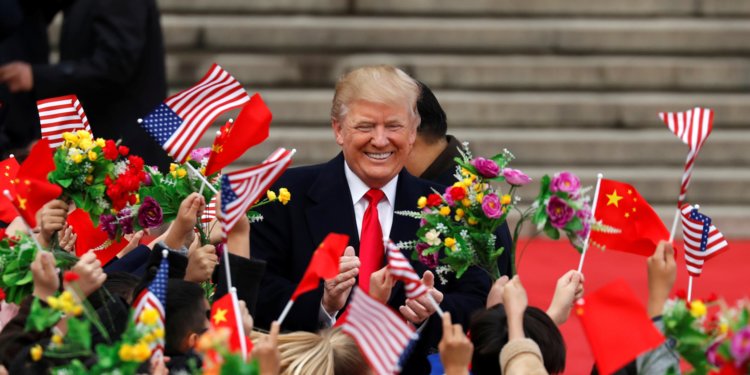Trumps Trade Dispute with China – The Players and the Strategists
First a breakthrough, then again not: the trade dispute between the USA and China is going back and forth. Beijing has recognized that the US government is at loggerheads – and is making cool use of this.
“My way of doing business is very simple,” wrote Donald Trump in his bestseller The Art of the Deal. “Sometimes I give in, but mostly I get what I want.”
The book from 1987 founded the myth Trump. Today we know: Trump’s talent as a wheeler is at least doubtful, his great business wisdoms were invented by a ghost writer. However, he has a talent for self-marketing with which he made it to the White House.
But that’s where Trump’s production reaches its limits. Acute example: the trade dispute with China. The crisis erupted in March when Trump threatened punitive tariffs on Chinese imports, followed by counter threats from Beijing. Two high-level discussion groups were to prevent the conflict from escalating into a real trade war.
The last meeting in Washington, however, raised more questions than it answered. It ended this weekend with a meaningless statement, followed by contradictory appearances by his economic advisors. Nevertheless, the president praised himself in tweets on Monday for a breakthrough that did not exist.
Maybe that’s a negotiating strategy. But Trump and his team probably underestimated the Chinese. They, in turn, used dilettantism, internal strife and general disorientation among the Americans to block the recent negotiations. Trump’s people were still trying to trick the Chinese delegation at the last minute, according to several US media: Chief economic advisor Larry Kudlow hastily reported that Beijing was prepared to buy US products worth at least 200 billion dollars in order to reduce trade inequality – a figure that was addressed but never decided.
China denied, Kudlow rowed back, the talks were adjourned. The joint declaration, which they fought for until late at night, contained only vague declarations of intent.
China wants to import more American agricultural products and energy than before – which was planned anyway: “To meet domestic demand, China must import energy, animal feed and meat,” Brad Setser of the Council on Foreign Relations told the Washington Post. Such a deal would have been “offered to every US president”.
Beijing’s announcement on Tuesday to reduce import duties on cars does not solve the real conflict either. Trump wants China to reduce its billion-dollar trade surplus.
Nevertheless, in return for China’s announcements to date, the US has suspended the threatened punitive tariffs for the time being – which benefits the People’s Republic more than the US and was propagated by the Chinese state media as the greatest success of the talks: The USA had unilaterally agreed not to “start a trade war”. Also all other stimulating topics resulted only in vague phrases.
Here tactics, there chaos
China is playing for the long term, while Trump is acting on a short-term basis. He is obviously more concerned with a quick victory, a crisp slogan for the congress election campaign in the fall – and possibly even personal countertrades for the benefit of his own company.
How chaotic and uncoordinated the US procedure is, especially without an informed tour from the Oval Office, was already shown in the first round at the beginning of May. Kudlow, Finance Minister Steven Mnuchin, Trade Minister Wilbur Ross, Trade Representative Robert Lighthizer and Trump Advisor Peter Navarro travelled to Beijing. There was a gulf through the delegation, symbolic of the entire government: on the one hand, hardliners like Navarro who want to neutralize China; on the other hand, traditionalists like ex-banker Mnuchin. In Beijing they were so divided that according to US media reports they publicly shouted at each other and Navarro was temporarily excluded.
That was convenient for the Chinese. According to the New York Times, they had been cultivating Mnuchin, who advocated a gentler gait, for months as their “main contact”. It worked out: In Beijing, he conferred privately with the Chinese chief negotiator Liu He – which led to the vociferous dispute with Navarro.
The tactic from “The Art of the Deal” turns out to be a flop in the most momentous way so far. The book traced eleven steps to success at that time, from “Don’t dribble, but pad” to “Have fun! However, the others seem to be having the most fun at the moment.


